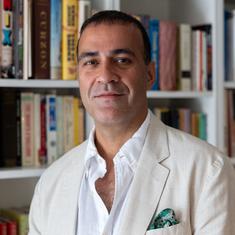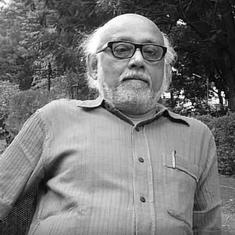Even though she was barely 17, Satyavati had a backstory King Shantanu would never learn. She hadn’t always smelled this good. In fact, she used to smell like a whole shoreline littered with dead carp at high noon. Her nickname across five villages was Matsyagandha, which meant, literally, Fish-stink. The ferry she operated didn’t get much business. She hadn’t even told her father what had happened to her two years ago. The fisherman should have known better – what was he thinking, letting his teenaged daughter ferry strangers across a river, unsupervised? She was bound to encounter a randy old man sooner or later. Most people kept away from her fish stink, granted, but the sage Parasara had a cold that day. If he hadn’t, the whole course of history and literature would have been different.
Satyavati’s dirty old man happened to be one of the greatest wise men of his day. Parasara was literally dirty, having meditated for several months in the same place. Sparrows had nested in his topknot, and a monsoon mudslide still crusted his skin dark. His eyes were bloodshot. He didn’t pay attention to the girl ferrying him across until he sneezed several times and blew his nose. When he brought his saffron shawl down from his face, he gagged on the revealed fish stink and registered the fisherman’s daughter for the first time.
In spite of the stink, he gasped with pleasure. He had spent so much energy these past months quelling his sexual desires that now, in his exhaustion, he couldn’t control his response. The slender apsara in rags, with her lightly muscled arms working the oars and her knees just inches from his . . . Parasara hurriedly drew his shawl over his lap.
“What is that smell? Has some poison in the river killed off all the fish around here?”
“No, that’s just me. They call me Fish-Stink around here.”
“A body like yours deserves to smell better.”
Parasara wasn’t the most tactful seducer; his fifty-some years had been spent in samadhi and Sanskrit grammar. “You’re more beautiful than any princess. I should be rowing you around.” Satyavati, who had heard about old sages and their brutal lifelong curses, froze and handed him the oars. The great yogi rowed her to the middle of the river, then made his strokes lazy and light so the boat didn’t progress. At last, he came out and asked for what he wanted. Satyavati said, “Out here? In the middle of a river?” Parasara muttered two Sanskrit slokas. A thick fog hissed from the rushes on either bank, and darkness curtained them off. “There. We’re alone now.”
“But you yourself said I stink.” Satyavati looked around uneasily, drawing her arms across her chest. “I’ll just go home and wash up . . .”
“I’m giving you a boon. Do you know what a boon is? It’s the opposite of a curse.” She nodded at him. “Do you want one?” Satyavati bit her lip and pondered for a moment. When else would she get this chance to better her lot? Luckier-born folks were always helping each other out, trading blessings and boons and medicinal verses.
All people smelled of their trades – seed sowers of sweat, swordsmiths of soot, priests of incense, warriors of horses. She was stuck with a fish smell, and a bad case of it. Even the daughters of other fishermen stiffened in her company and found a way to stand upwind. “What kind of boon?” Parasara thought of a boon that would please them both. “From now on, you’ll smell better than any woman on earth, no matter when you soaped last or how much fish you eat.” Satyavati sniffed her arm, and she smelled the happiest smells of all her past lives. How could she not have warmed, just a little, to this fearsome wonder-worker?
“I still can’t,” she apologised.
“What about my future husband? He’ll know on our wedding night that I’ve . . .”
“You’ll seal back up,” said Parasara. Some sages, when they spend enough time in samadhi, start seeing the future. He might have been thinking of King Shantanu when he promised, “Trust me, even after you have my baby, he’ll never be able to tell.” Even after you have my baby. That way of phrasing it made it sound like it had already happened. And in a sense it had, in the infinite repetitions of cyclic time. Everything we do, Satyavati thought, is just a rehearsal for the next time; everything we do is what we’ve already done. She felt those parallel past and future Satyavatis, in prior universes and universes still to come, synchronise and slide on to the floor of that little ferryboat, where the first drops of blood in this epic were shed.
A whole armada of Satyavatis, nine months later, rowed to a mid-river island and gave birth, each in her own respective kalpa, to a baby boy. The baby’s skin was as dark as Parasara’s skin had been, caked as the old sage was with fog-shadowed monsoon mud. She named her baby for the beautiful darkness of his skin. She named him Krishna.
No, no that Krishna. This Krishna, generations his elder, went on to become the greatest poet in human history, in part because he told the story of that Krishna, and in part because he wrote the bloodiest, most mystical epic ever. He lived to meet that Krishna, and he wrote his poems under the name Vyasa. A God with the head of an elephant took dictation from him once. Unlike other epic poets, Vyasa’s characters were his own lineal descendants. He was their first author in more ways than one.

Excerpted with permission from The Book Of Vows: The Mahabharata Trilogy, Volume 1, Amit Majmudar, Penguin India.










